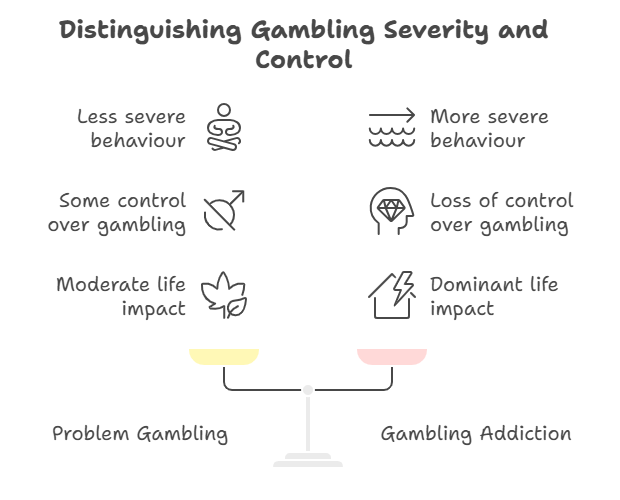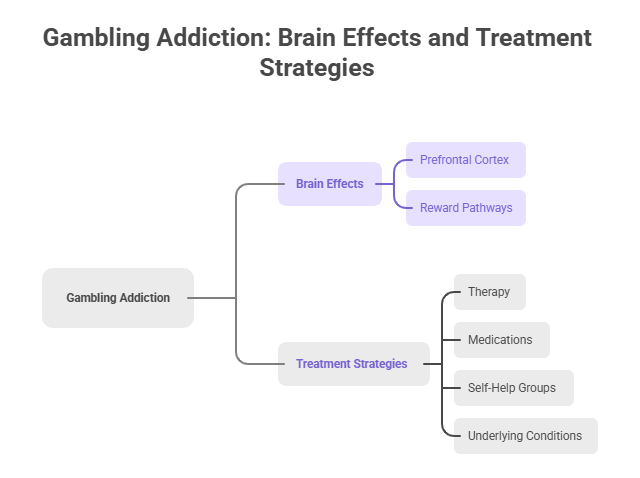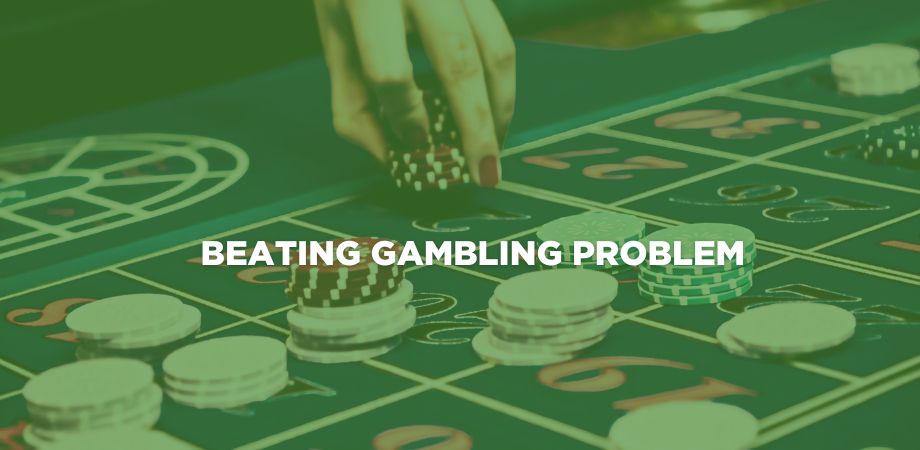Gambling addiction is a serious behavioural disorder that goes far beyond casual betting or occasional games of chance. It is characterised by an uncontrollable urge to gamble despite negative consequences to finances, relationships, work, or health. 7.4% of college students in South India reported being problem gamblers, as noted by Bhatia et al. 2016 in “The Prevalence, Patterns, and Correlates of Gambling Behaviours in Men: An Exploratory Study from Goa, India.”
The signs of gambling addiction include compulsive gambling, lying about losses, and chasing bets.
The causes of gambling addiction range from genetic predisposition to environmental stressors. Gambling addiction has several effects, such as financial debt, strained family bonds, and even mental health conditions like anxiety and depression.
Effective treatment for gambling disorder exists, such as de-addiction programs like therapy, medications, and support groups, which empower individuals to regain control.
What Is Gambling Addiction?
Gambling addiction, also called compulsive gambling or gambling disorder, is a behavioural addiction where individuals cannot resist the urge to gamble, even when it disrupts their lives. According to the American Psychiatric Association (APA, 2013), gambling disorder is recognised in the Diagnostic and Statistical Manual of Mental Disorders (DSM-5), placing it alongside substance-related addictions owing to similarities in brain activity and compulsive behaviours.
Globally, gambling addiction affects 0.1–5.8% of adults, depending on region and accessibility to gambling activities, as detailed by Calado F. & Griffiths M. 2016 in their paper “Problem Gambling worldwide: An Update and Systematic Review of Empirical Research (2000-2015).”
In India, the rise of online betting platforms has increased gambling-related harm, particularly among young adults, though comprehensive national statistics remain limited.
In “Biopsychosocial-Based Exercise Model for Rheumatic Diseases”, researchers showed that a 12-week Biopsychosocial-Based Exercise Therapy (BETY) program significantly bolstered outcomes for people with rheumatic conditions. Participants reported better physical function, reduced fatigue, improved mood, stronger social participation, better sleep, and enhanced sexual health compared to control groups, confirming BETY’s effectiveness in ameliorating overall quality of life.
What Is the Difference Between Gambling Addiction and Problem Gambling?

The main difference between gambling addiction and problem gambling lies mainly in the severity and control of the behaviour.
Problem gambling refers to gambling behaviour that causes harm (financial stress, relationship problems, anxiety) but has not yet developed into full-blown addiction.
Gambling addiction, on the other hand, involves a loss of control where gambling becomes a dominant life activity, resembling substance addiction.
For example, a person who occasionally overspends at a casino is a problem gambler, while someone who steals money to place bets despite losing everything is exhibiting addiction.
While both are harmful, gambling addiction is the most severe form and is acknowledged as a mental health disorder. In contrast, problem gambling is an early stage or less intense pattern that escalates into full addiction if left unaddressed.
What Are the Signs and Symptoms of Gambling Addiction?
The common signs and symptoms of gambling addiction are loss of control, preoccupation with betting, withdrawal-like irritability, chasing losses, and lying about gambling. These indicators worsen over time if left untreated.
The signs and symptoms of gambling addiction are explained below:
- Financial Distress: Financial problems are the most visible symptom, with individuals accumulating debt, pawning possessions, or borrowing money to continue gambling.
- Preoccupation With Gambling: An obsession with gambling activities, such as constantly thinking about strategies, reliving past wins, or planning the next bet, is a key marker.
- Repeated Unsuccessful Attempts to Stop: Many individuals with gambling addiction recognise the problem yet fail to cut down or quit despite multiple efforts.
- Lying to Conceal Gambling: Dishonesty about time or money spent gambling is common to protect the habit from scrutiny by loved ones.
- Withdrawal-Like Symptoms: Much like substance addictions, some individuals experience irritability, restlessness, or mood swings when unable to gamble.
- Chasing Losses: Continuously betting to recover lost money, known as “chasing losses,” is a defining behaviour.
- Neglect of Responsibilities: Missing work, school, or family obligations due to gambling is another critical sign.
- Emotional Disturbances: Feelings of guilt, shame, anxiety, or depression accompany a gambling disorder. Comorbidity between gambling and mood disorders is high, requiring integrated treatment approaches.
What Are the Causes of Gambling Addiction?
The leading causes of gambling addiction are genetic vulnerability, environmental influences, co-occurring mental disorders, peer pressure, and trauma. Like substance addictions, gambling activates the brain’s reward system, releasing dopamine that reinforces the compulsion to gamble.
The common causes of gambling addiction include:
- Genetic factors: A family history of addictive disorders exacerbates susceptibility. The study “Genetic And Environmental Influences On Gambling: A Meta-Analysis Of Twin Studies” found that gambling addiction has a moderate genetic basis, with heritability estimated at 50%. The analysis showed that genetic influence was stronger for disordered gambling (53%) compared to general gambling behaviour (41%). It also revealed that these genetic factors had a greater impact on adults than adolescents, and were more pronounced in males (47%) than females (28%).
- Environmental factors: Easy access to casinos or online betting apps heightens risk.
- Co-occurring disorders: Anxiety, depression, and ADHD co-exist with gambling disorders.
- Peer pressure: Social circles that normalise betting (e.g., cricket matches in India) elicit compulsive gambling.
- Trauma or stress: Gambling becomes a coping mechanism for unresolved trauma or financial stress.
- Early exposure: Starting gambling at a young age substantially raises the risk of developing addiction later.
What Are the Effects of Gambling Addiction?
The main effects of gambling addiction are financial devastation, relationship breakdowns, mental health deterioration, and an increased risk of suicide.
The effects of gambling addiction are listed below:
- Financial problems: Severe debt, bankruptcy, or criminal activity to obtain gambling money.
- Relationship strain: Loss of trust, divorce, and family breakdown.
- Mental health issues: Depression, anxiety, and substance abuse are common comorbidities.
- Social stigma: Shame and secrecy isolate individuals further.
- Legal consequences: Fraud, theft, or unpaid debts lead to legal trouble.
How Does Gambling Addiction Affect Your Physical Health?
Gambling addiction indirectly harms your physical health by intensifying stress, which raises blood pressure, heart disease risk, and sleep disturbances. Prolonged stress also weakens the immune system, making individuals more vulnerable to illness.
How Can Gambling Addiction Affect Your Mental Health?
Gambling addiction can affect your mental health by triggering conditions such as anxiety, depression, and heightened stress levels. Individuals experience amplified feelings of guilt and shame, which decay self-esteem and evoke emotional distress.
How Does Gambling Addiction Affect the Brain?
Gambling addiction affects the brain by altering brain circuits, particularly in the prefrontal cortex and reward pathways, similar to substance addiction. Over time, the brain requires more gambling stimulation to achieve the same dopamine release, fortifying compulsive behaviour.
How Is Gambling Addiction Treated?
The treatments for gambling addiction are de-addiction programs like therapy, medications, self-help groups, and treatment of co-occurring conditions. Recovery timelines vary, but improvement is seen within 6-12 months of consistent treatment. Gambling addiction is treated with:

Therapy
Cognitive Behavioural Therapy (CBT) helps individuals understand gambling triggers and replace harmful behaviours with healthier coping mechanisms. It has a high success rate but requires commitment.
A study titled “Gambler: Behavioural-Cognitive Treatment of Online Gambling Disorder. A Step-by-Step Treatment Guide” by Choliz M. and Marcos-Moliner M., 2024, discovered that out of 40 patients diagnosed with online gambling addiction, 28 maintained abstinence after one year, reflecting a 70% treatment efficacy rate.
Medications
While no specific approved medication exists for gambling disorder, drugs like SSRIs (antidepressants), naltrexone, and mood stabilisers have shown effectiveness in reducing urges.
Self-Help Groups
Groups like Gamblers Anonymous (GA) provide peer support, accountability, and shared recovery strategies.
Treatment for Underlying Conditions
Managing depression, anxiety, or substance use is essential to prevent relapse.
How to Deal With Gambling Cravings?
To deal with gambling cravings, engage social support, delay urges, and find alternative activities. Isolation augments vulnerability to relapse. Staying socially engaged reduces temptation. When cravings arise, postponing gambling even for 30 minutes encourages urges to pass. Physical exercise, creative hobbies, or volunteering replace gambling with healthier dopamine-boosting activities
Do Gamblers Have a High Suicide Rate?
Yes, gamblers have a high suicide rate. Suicide helplines in Hyderabad have seen a 60% surge in calls from gambling addicts, many describing financial distress and mental health struggles triggered by betting losses, especially during major sporting events such as the IPL, as published by The Times of India. Tamil Nadu reported 17 suicides linked to online gambling over the past three years, according to SiGMA World, March 2025.
Does Gambling Addiction Cause Depression?
Yes. Gambling-related debt and shame frequently trigger depressive episodes.
Is Gambling Addiction a Disease?
Yes, accepted as a behavioural addiction in DSM-5, it functions like a disease affecting brain function and behaviour.
Is Gambling Addiction a Disability?
Gambling addiction is considered a disability in certain contexts because it impairs a person’s ability to handle daily life, work, and relationships. Chronic gambling addiction qualifies as a mental health disability under legal frameworks, such as the Americans with Disabilities Act (ADA), when it substantially limits major life activities.
This classification allows individuals to access accommodations and support for treatment and recovery. In India, gambling addiction is not explicitly established as a disability under the Rights of Persons with Disabilities Act, 2016.
Is Gambling addiction the same as Alcohol Addiction?
No, gambling addiction and alcohol addiction are fundamentally different types of addictive disorders, though they share similar behavioral patterns and brain reward mechanisms. Alcohol addiction involves physical dependence on a substance with potentially dangerous withdrawal symptoms, and gambling addiction is a behavioral addiction that creates psychological dependence without chemical substances.





